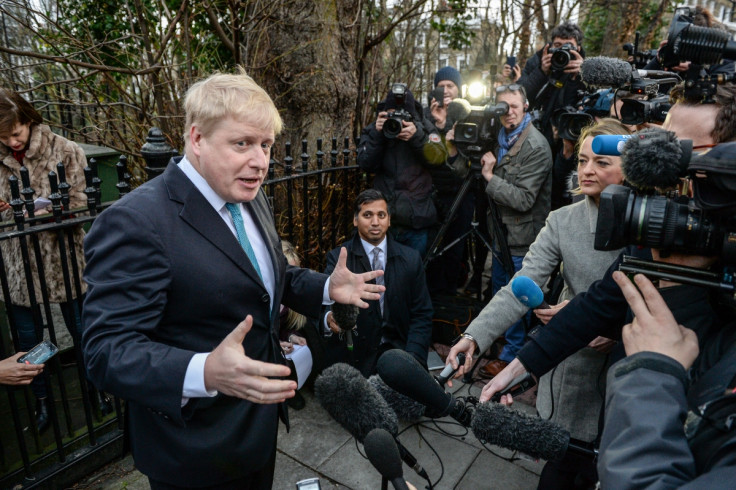Temporary uncertainty regarding the pound won't be damaging - as long as we remain in the EU

The London Borough of Islington, in which my family live, has seen nothing like such a media scrum since Tony Blair, who used to live round the corner from us, became prime minister in 1997. The circumstances that led to the virtual media siege on Boris Johnson's front door yesterday were somewhat different. In 1997, the world's media were covering the election of a new British prime minister. Yesterday they were there for Boris Johnson's decision to – when reading between the lines – make a bid for the premiership should David Cameron lose the EU referendum.
For behind all of Johnson's well-publicised 'agonising' about whether to support the prime minister, whom he has known since their school days at Eton, what you see is what you get: what Macbeth himself called "vaulting ambition".
While Cameron seems to have become more statesmanlike during his negotiations with his European counterparts, Boris Johnson has not. Now, students of Cameron know that he comes from a eurosceptic background; they also know that his reasons for calling a referendum were nakedly political, and aimed at shoring up his own and his party's position in the run-up to last year's election.
Read more: Boris may act in self-interest but he is the leader that 'Vote Leave' needs
But he has finally come down firmly on the side of the UK remaining in the EU, which he believes would be in the interests of both the UK and wider EU as they face some of the worst challenges for decades, among them the migrant crisis, terrorism and Russian revanchism.
Now, Boris Johnson is a very clever man, and he has written a clever apologia in today's Daily Telegraph for his decision to join the Brexit camp. However, it is difficult to reconcile the gist of his argument with any idea that he could have 'agonised' over it . He is very good at attacking the apparent deficiencies of Brussels – indeed, so passionate that clearly the only 'agonising' could have been about whether to risk his political career by not supporting the prime minister.
Johnson writes: ' We will hear a lot in the coming weeks about ... the risk to the economy , the risk to the City of London, and so on; and though those risks cannot be entirely dismissed, I think they are likely to be exaggerated.' He points out that we heard this kind of thing about Gordon Brown's decision not to join the euro 'and the very opposite turned out to be the case.' He is right, but a vote to leave the EU would be very different.
There seems little doubt that overseas investment in the UK has been encouraged by our membership of the EU, and that British business benefits enormously not only from membership of the single market but also from the ability of the EU to negotiate trade deals with other large trading blocs, such as the US and China.
Which brings us the panic in the ranks that seems to have broken out today in market reaction to what is seen as the increased possibility of a Brexit becoming a reality. Well, call me complacent, but I have been around a long time and take with a pinch of salt all this stuff about markets 'not liking uncertainty'. There are quite a lot of operators in the financial markets whose very raison d'etre is trading on uncertainty. They make money out of it – or, at least, try to.
As to the 'fall in the pound', can the people who are worried about this possibly be the same people who have been worrying about the size of the UK's trade and balance of payments deficit, and the perceived over-valuation of sterling? I think we should be told. I am not sure that a couple of months of uncertainty would be all that damaging, provided the bookmakers are right and in the end the British public opts, with its customary conservatism, for the status quo.
What worries me more is the weakness of the world economy, which seems to have brought even the Organisation for Economic Co-operation and Development (OECD) back to its Keynesian origins. With so many bankers, officials and commentators bemoaning the limits of monetary policy, the OECD is advocating a concerted fiscal boost rather than more austerity. This advice should be taken seriously by the world's leading finance ministers, who are due to meet in Shanghai soon.
© Copyright IBTimes 2025. All rights reserved.






















